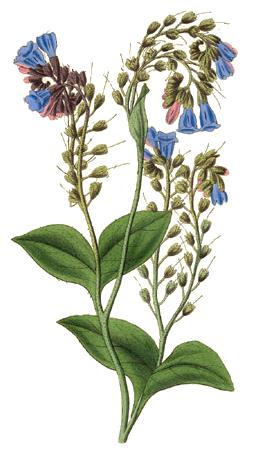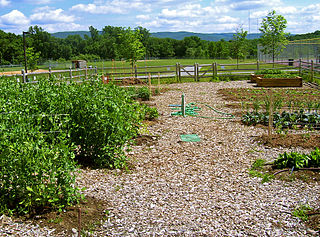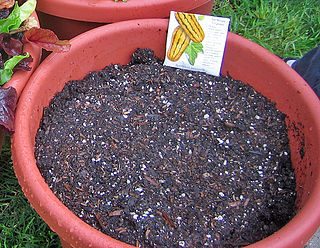
Symphytum is a genus of flowering plants in the borage family, Boraginaceae, known by the common name comfrey.
No-dig gardening is a non-cultivation method used by some organic gardeners.

The following outline is provided as an overview of and topical guide to organic gardening and farming:

Organic lawn management or organic turf management or organic land care or organic landscaping is the practice of establishing and caring for an athletic turf field or garden lawn and landscape using organic horticulture, without the use of manufactured inputs such as synthetic pesticides or artificial fertilizers. It is a component of organic land care and organic sustainable landscaping which adapt the principles and methods of sustainable gardening and organic farming to the care of lawns and gardens.

Ryton-on-Dunsmore is a village and civil parish in the Borough of Rugby, Warwickshire, England. It is situated 6 miles southeast of Coventry and 8 miles west of Rugby. The 2001 Census recorded a population of 1,672 in the parish, increasing to 1,813 at the 2011 Census. The A45 dual carriageway bissects Ryton, and nearby villages include Bubbenhall, Stretton-on-Dunsmore and Wolston. Garden Organic, the leading organic growing charity in the United Kingdom, has a 10-acre (4-hectare) demonstration garden dedicated to organic gardening in the village. Ryton Pools Country Park is about a mile south-west of the village.

A mulch is a layer of material applied to the surface of soil. Reasons for applying mulch include conservation of soil moisture, improving fertility and health of the soil, reducing weed growth, and enhancing the visual appeal of the area.

A garden centre is a retail operation that sells plants and related products for the domestic garden as its primary business.

Yalding is a village and civil parish in the Borough of Maidstone in Kent, England. The village is situated 6 miles (9.7 km) south west of Maidstone at a point where the Rivers Teise and Beult join the River Medway. At the 2001 census, the parish, which includes the villages of Benover, Laddingford and Queen Street, had a population of 2,236. increasing to 2,418 at the 2011 Census.

Henry Doubleday (1810–1902) was an English scientist and horticulturist of Coggeshall in Essex.
Lawrence Donegan Hills was a British horticulturalist and writer. In 1954, he founded the Henry Doubleday Research Association in Bocking, near Braintree, Essex. By the time he retired in 1986, HDRA was the largest body of organic gardeners in the world and had moved to Ryton-on-Dunsmore, near Coventry.

The traditional kitchen garden, vegetable garden, also known as a potager or in Scotland a kailyaird, is a space separate from the rest of the residential garden – the ornamental plants and lawn areas. It is used for growing edible plants and often some medicinal plants, especially historically. The plants are grown for domestic use; though some seasonal surpluses are given away or sold, a commercial operation growing a variety of vegetables is more commonly termed a market garden. The kitchen garden is different not only in its history, but also its functional design. It differs from an allotment in that a kitchen garden is on private land attached or very close to the dwelling. It is regarded as essential that the kitchen garden could be quickly accessed by the cook.
Major Henry Herbert Kitchener, 3rd Earl Kitchener TD DL, styled Viscount Broome from 1928 to 1937, was a British peer. He was unmarried, and when he died the title Earl Kitchener became extinct.

Potting soil or growing media, also known as potting mix or potting compost (UK), is a substrate used to grow plants in containers. The first recorded use of the term is from an 1861 issue of the American Agriculturist. Despite its name, little or no soil is usually used in potting soil.

Yalding Gardens were demonstration gardens open to the public near Yalding, Kent in April 1995.
The Rooftop Garden Project is an experimental urban gardening project in Montreal, Canada.

Community gardens in the United States benefit both gardeners and society at large. Community gardens provide fresh produce to gardeners and their friends and neighbors. They provide a place of connection to nature and to other people. In a wider sense, community gardens provide green space, a habitat for insects and animals, sites for gardening education, and beautification of the local area. Community gardens provide access to land to those who otherwise could not have a garden, such as apartment-dwellers, the elderly, and the homeless. Many gardens resemble European allotment gardens, with plots or boxes where individuals and families can grow vegetables and flowers, including a number which began as victory gardens during World War II. Other gardens are worked as community farms with no individual plots at all, similar to urban farms.
The Agroforestry Research Trust (ART) is a British charitable incorporated organisation that researches temperate agroforestry and all aspects of plant cropping and uses, with a focus on tree, shrub and perennial crops. It produces several publications and a quarterly journal, and sells plants and seeds from its forest gardens.

Climate-friendly gardening is a form of gardening that can reduce emissions of greenhouse gases from gardens and encourage the absorption of carbon dioxide by soils and plants in order to aid the reduction of global warming. To be a climate-friendly gardener means considering both what happens in a garden and the materials brought into it as well as the impact they have on land use and climate. It can also include garden features or activities in the garden that help to reduce greenhouse gas emissions through processes not directly related to gardening.
The Seed Savers' Network (SSN) is an Australian not-for-profit organisation, based in Byron Bay, New South Wales. Since 1986, SSN has organised gardeners and farmers to collect, multiply and redistribute garden seeds in Australia and also within peasant organisations worldwide.

Susan Campbell was an English illustrator, food writer, garden historian and leading authority on the history of walled kitchen gardens.













